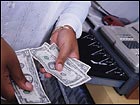|
Consumer outlook improves
|
 |
December 21, 2001: 10:42 a.m. ET
Michigan survey finds confidence up as spending, income fall; 3Q GDP off 1.3%.
|
NEW YORK (CNN/Money) - The confidence of the nation's consumers is improving more rapidly than expected, according to a recent survey, even as government data released Friday showed that consumer spending fell in November and the nation's economy slowed even more than originally thought in the third quarter.
Reuters reported that the University of Michigan's survey of consumer sentiment put the final consumer confidence number in December at 88.8. That's up from the preliminary reading of 85.8 earlier in the month, and the 83.9 at the end of November. The closely watched index is available to paid subscribers.
Consumer spending fell 0.7 percent, the Commerce Department reported, as auto sales slowed from the record levels in October that were sparked by zero-interest financing offers. Still the decline was slightly less than expected by analysts surveyed by Briefing.com, who forecast a 0.8 percent fall. Spurred by car sales, spending shot up 2.9 percent in October.
Personal income fell 0.1 percent in November, surprising analysts who were looking for a 0.2 percent gain. The government report also revised the October personal income data to show a 0.1 percent decline rather than the no change originally reported.
The gross domestic product, the broadest measure of the nation's economy, fell 1.3 percent in the third quarter, according to the government's final reading of that measure. The previous reading had put the decline at 1.1 percent.
It was the worst performance for the economy since the 2.0 percent decline in the first quarter of 1991.
Despite the economic numbers released Friday, the consumers weren't the only ones seeing some sign of life in the economy. A Federal Reserve Bank of Philadelphia survey of economic forecasters released Friday found a consensus that the U.S. economy will lift itself out of recession and begin recovering by the middle of 2002, and inflation will drop.
The 31 participants in the Livingston Survey of economists from industry, government, banking and universities also see the economy growing rapidly in 2003, it said.
The forecasters, surveyed twice a year by the Philadelphia Fed, project that the economy will grow at an annual rate of 1.5 percent in the first half of 2002 and at a rate of 3.5 percent in the second half.
They predicted the unemployment rate would rise from 5.8 percent this month to 6 percent by June 2002, then decline to 5.8 percent by the end of 2002. On an annual average basis, unemployment will be 6.0 percent in 2002 and 5.8 percent in 2003, they said. 
Reuters contributed to this report
|
|
|
|
|
|

|

